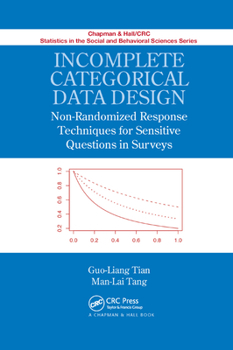Incomplete Categorical Data Design: Non-Randomized Response Techniques for Sensitive Questions in Surveys
Select Format
Select Condition 
Book Overview
Respondents to survey questions involving sensitive information, such as sexual behavior, illegal drug usage, tax evasion, and income, may refuse to answer the questions or provide untruthful answers to protect their privacy. This creates a challenge in drawing valid inferences from potentially inaccurate data. Addressing this difficulty, non-randomized response approaches enable sample survey practitioners and applied statisticians to protect...
Format:Paperback
Language:English
ISBN:0367379627
ISBN13:9780367379629
Release Date:October 2019
Publisher:CRC Press
Length:322 Pages
Weight:1.30 lbs.
Dimensions:0.9" x 6.3" x 9.2"
Customer Reviews
0 rating





